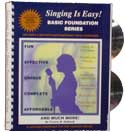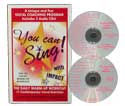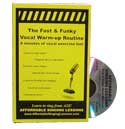|
FREE
SINGING LESSONS - ARTICLES
|
Learning
the Art of Productive
Vocal Practice.
Copyright © Yvonne DeBandi 2001
Studies
have proven that a child who learns good study habits will
have an easier and more rewarding educational experience.
Did you know the same is true for singing? While it
is important to exercise and work our voices often, when practicing
song material it is not always how much or how long you practice,
but whether or not your practice time is productive.
How do you rate your practice time?
Many
students practice singing songs over and over again in their
entirety. While there is often some measure of improvement
due to the repetition, this repetition can also be detrimental.
If a singer continues to perform a phrase with an error, the
error will then become a habit. Because our voice organs
are made up of many muscles and membranes and much of singing
is muscle memory, instilling the memory to continually sing
a phrase a certain way can be a difficult thing to overcome.
The best way to avoid these vocal frustrations is to learn
the art of productive practice.
Here
are some tips:
1.
Always make sure you are properly warmed up.
2.
Record yourself singing the song or the vocal exercise you
wish to learn. Sing it as well as you can in its entirety
(or as much as you can). This recording is to give you
a reference point for monitoring improvement. Be sure
to label the recording properly for easy reference later.
We suggest a label such as "09-10-01 The Star Spangled Banner
– Vocal Practice (First Run Through)." Get organized
early and save yourself time later.
3.
It is now time to dissect the song material and break it into
manageable pieces. First analyze what you would consider
the first phrase, first section or the "problem section" of
the material. An analysis would consist of:
a)
Listening to the recording.
b)
Taking note (and making notes if you are a serious singer)
of what it is you would like to sound better or different.
4.
Once you have determined what you would like to sound different
in this section, it is important to understand what it takes
to accomplish your goal. This is where it
can get a little tricky, but knowing the facts can make most
vocal frustrations easy to fix with a little practice.
Consider
that a singer is an:
Athlete
- Fine tuning and conditioning of the vocal instrument (the
body) directly effects singing and therefore makes each
singer an athlete in their own right. If the performance
skill or ability can be obtained from the development of
muscles or muscular coordination it falls in this category.
Student
- True musicianship requires a certain amount of music analysis
and music theory knowledge, from proper phrasing to rhythmic
execution. If the knowledge can be obtained from a
book, it falls in this category.
Artist
- Music is a beautiful form of individual expression.
If the vocal ability includes the sincerity, creativity,
individuality or the emotional content of the performance
it falls into this category.
If
you are working on a song in a specific style and the performance
problem lies in a basic foundation technique like inconsistent
airflow, then obviously studying rhythm patterns and listening
to artist renditions of that stylistic song material will
not help you. You see, the problem isn't with the Student
or Artistic Department; it is a problem with the Athletic
Department (as are most beginning and intermediate singer
issues) and should be addressed as such. Specific focus
should be placed on the individual athletic issue(s) involved.
Sometimes
just recognizing the department and specific vocal issue solves
the problem; and, rehearsing the section or phrase with concentration
on this area is all you need. So practice it a
few times and monitor your success rate. If you are
satisfied with your performance, add the section or phrase
back into the full song and start the process over.
Be sure to compare your first recorded performance to your
new one. The section you have worked on should show
improvement on the recording.
If
realizing the vocal challenge is not enough ammunition to
conquer it or if you have multiple challenges in one section
or phrase, we suggest the training singer strip everything
back to the basics. This technique involves working
with vocal exercises geared to develop the necessary skills
causing the current struggle. If the underlying problem
is with inconsistent airflow then do some basic foundation
exercises geared to develop a consistent and strong air flow
before trying the section again. In fact, repeating
this process at least three times (exercise / sing / exercise
/ sing / exercise / sing) will help apply the concept to real
world singing.
A
word of caution: When working with this technique be sure
to add the section or phrase you have worked back to the entire
passage or song material. It is just as detrimental
to learn to never complete a song as it is to learn to sing
a song with the same mistakes.
So
remember to keep your practice time productive and keep it
simple. Review the song material providing the challenge
and logically determine what simple steps are necessary to
achieve your goal. Singing usually does take practice,
practice, practice; but, knowing how to fill that time
can make all the difference in the speed of your vocal improvement.
Training
products created by
Coach Yvonne DeBandi.
Books, Interactive Downloads and CDRoms available!
Click HERE
to learn more. |
 |
 |
 |
|
|



